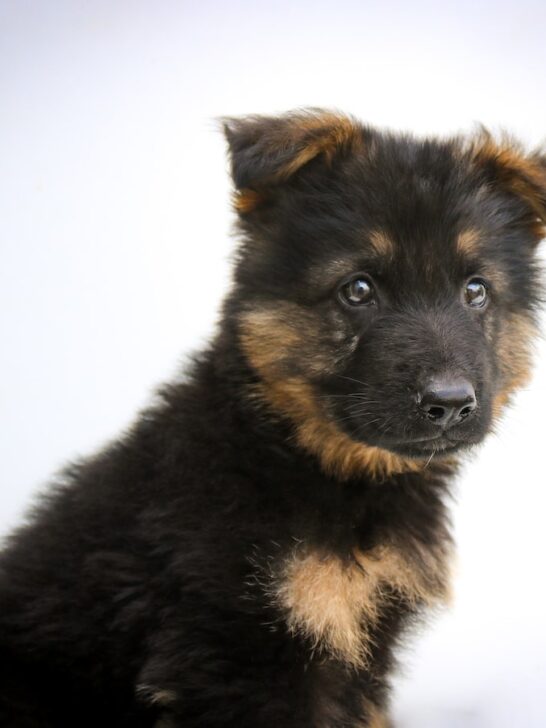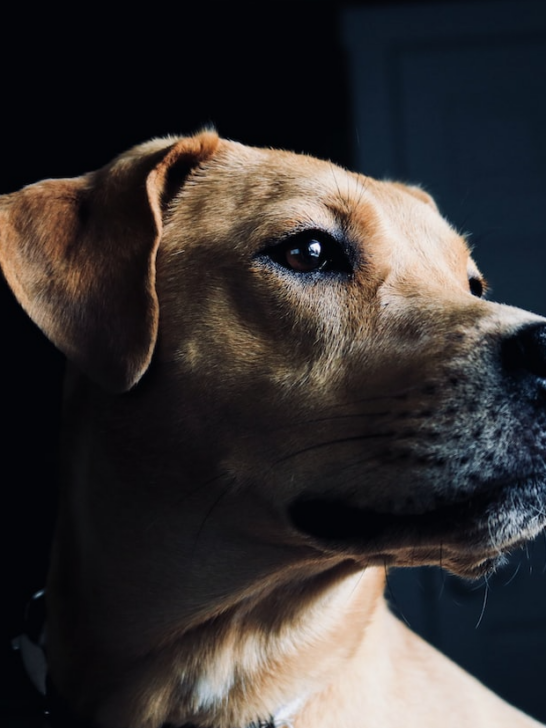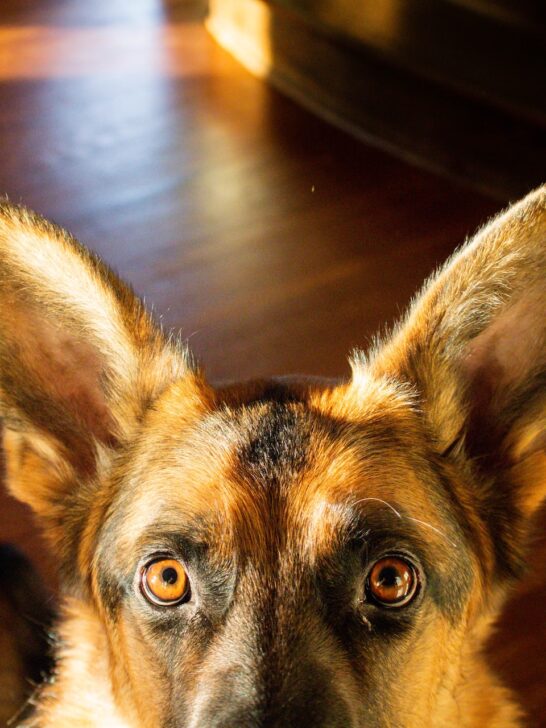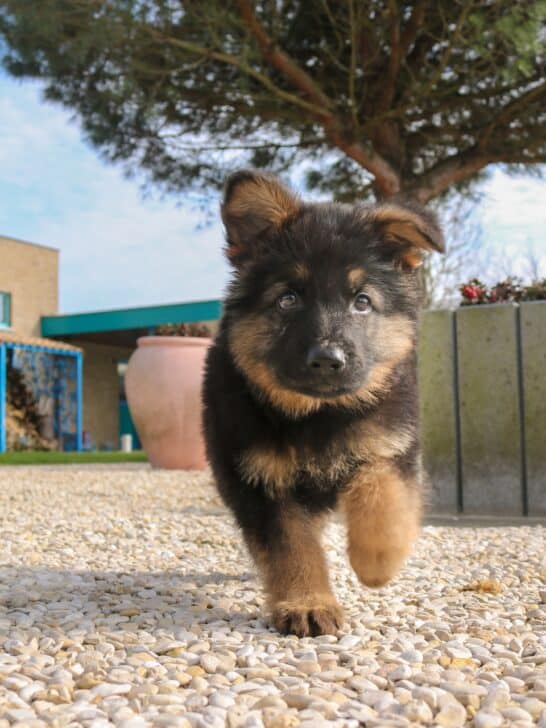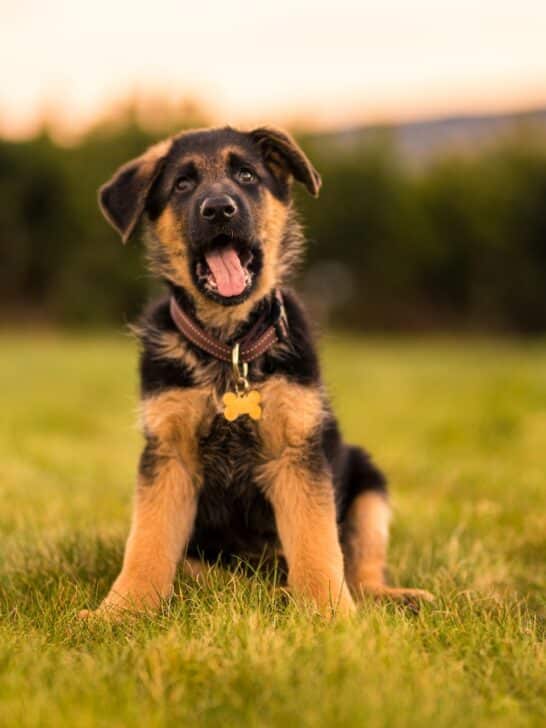Why Does My German Shepherd Puppy Drink So Much Water: What’s Normal and What’s Not?
Your puppy could be drinking a lot of water because it is normal for puppies to drink more water than adults.
However, you want to make sure your puppy’s water consumption is at an appropriate level to avoid serious problems that might arise.

How Much is Normal for a German Shepherd Puppy to Drink?
Jan Reisen points out that how much puppy drinks depends on activity level, size, and age. Puppies consume more water than adults.
The youngest puppies entirely dependent on their mothers’ milk receive all the hydration they require from nursing.
Once weaning starts, German Shepherd puppies will begin to have a need for water to replace the mother’s milk.
When puppies start eating solid food, half a cup of water every two hours is reasonable. After weaning, a puppy needs half an ounce to an ounce of water per pound of body weight.
An eight-week-old puppy might require 20 ounces of water daily.
What is the Importance of Water to Your German Shepherd Puppy?
One of the reasons water is so vital to your German Shepherd puppy is because of its influence on the metabolic process. This process includes breathing, blood flow, brain activity, and digestion.
Sufficient water, which makes up most of the blood supply, allows the blood to transport oxygen and clear away toxins that can harm your puppy.
Because insufficient water negatively impacts this process, a dog is at risk of organ damage.
How much water your puppy gets also allows them to regulate their body temperature.
Panting uses respiration to help release water, which is why you’ll notice your German Shepherd Dog puppy panting more during hot weather or after exertion.
However, panting is a double-edged sword, in that your puppy loses more water during this process.
When hot weather or heavy physical exertion is making your puppy pant more, the dog will require more water.
Proper metabolic processes will help safeguard your German Shepherd’s health. When everything functions correctly, your dog will have an appropriate energy level.
An adequate energy level helps ensure proper health.
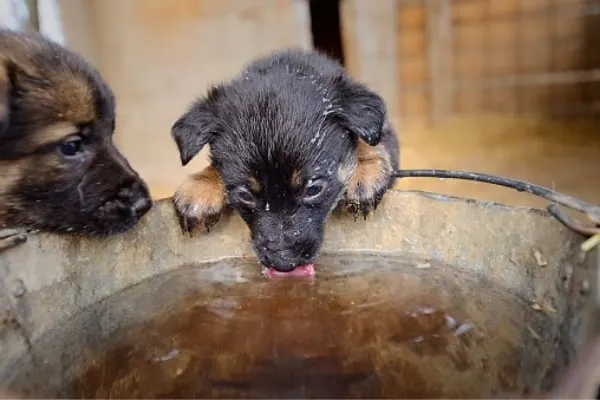
How Much Should Your Shepherd Puppy Drink During Housebreaking?
One of the times when you might need to make some changes to your GSD puppy’s water intake is during housebreaking.
Taking up the water at night is a good idea, although you will need to make sure you have a consistent schedule.
Water and food for your puppy should be taken up two or three hours before your family usually goes to bed.
Always make sure the puppy has a chance for an extra bathroom break before everyone goes to bed, so you don’t have any “surprises.”
Mary Nielson advises keeping a close eye on your puppy’s habits. Any changes in how much your puppy drinks may require closer evaluation at your next vet visit.
How Do You Make Sure Your Puppy is Well-Hydrated?
Even young German Shepherd puppies have good instincts about self-regulating their water usage.
However, diarrhea, excessive urination, fever, and vomiting can all dehydrate your puppy. A diet of too much dry food can also cause dehydration.
Some dogs also don’t drink a lot of water naturally, even when it is made available to them all day. Making sure you know the dehydration signs so you can check your puppy for them makes a difference.
Wendy Bedwell-Wilson emphasizes the importance of proper hydration and also points out a couple of ways to find out if your dog is adequately hydrated.
One way to check is to gently grab the scruff of your German Shepherd puppy’s neck, stretch it out, and let it go.
Skin that snaps back into place is a sign of a well-hydrated dog, while skin that slowly snaps back is a sign of dehydration.
Another way to check your puppy’s hydration level is to feel their gums. Sticky or day gums are a sign of dehydration.
Also, gently press their gums and see how long it takes for them to change back to a healthy pink color, no more than three seconds.
When your German Shepherd puppy is mildly dehydrated, gradually give them smaller sips of water. Ice cubes can help provide extra hydration relatively quickly.
You can also try an electrolyte powder mix, as these are quite effective.
If your puppy is severely dehydrated, evidenced by a loss of skin elasticity, consider this situation a medical emergency.
When your puppy has severe dehydration, IV fluids may be necessary to restore proper fluids.

What If Your German Shepherd Puppy Won’t Drink Much Water?
Some German Shepherd puppies aren’t as inclined to drink as much water as others. However, there are a few things you can do to encourage more drinking.
These things are all simple and likely to increase your dog’s drinking.
Always make sure your puppy’s water is fresh, and in a clean bowl. Some dogs will avoid drinking water if what they are offered isn’t clean or in a clean bowl.
The cleaner both the water and the bowl are, the more they will entice your dog.
Consider placing the bowl near your puppy’s bed or crate, where they eat, or another favorite spot in the house.
Sometimes a dog will not be as inclined to use their water bowl if it’s away from areas where they spend a lot of time.
When you see your puppy drinking water out of the bowl, praise the dog and give them a treat.
German Shepherds are very responsive to rewards, and associating drinking water with a reward will encourage them to do so even without prompting on your part.
Offering the water in the form of ice cubes can be an enticement for a dog. Dogs often love ice cubes as a treat that provides plenty of amusement.
Another bonus is that, if your puppy is teething, the ice cubes can provide relief.
Using chicken or bone broth to flavor the water can also entice your dog to drink more of it. Sometimes the added flavor provides an incentive that water alone does not.
However, make sure you check the water for freshness because broth can spoil.
Sometimes, all you need to do is make water a little more interesting for your puppy. After all, most of us don’t drink the same thing all the time.
Dogs love the variety as much as we do.
Is It Possible for a German Shepherd to Drink Too Much Water?
Your German Shepherd Dog can, in fact, consume too much water. Overhydrating, also known as water intoxication, can be just as dangerous as dehydration in its own way.
If your puppy is showing symptoms, veterinary help might be necessary.
When your dog plays in the water a lot of swims, they may accidentally swallow too much water. Drinking too much water at one time can also lead to this problem.
It is important to always supervise your dog around water.
Water intoxication can make your dog feel very sluggish and lose coordination, including having a staggering gait.
Nausea, vomiting, and bloating are some of the gastrointestinal symptoms that might occur.
Dilated pupils, excessive drooling, and pale gums are also signs of water intoxication.
When your dog has these symptoms after having had a lot of water to drink or has been swimming, overhydration is very likely.
Top Dog Tips highlights the importance of seeking veterinary help. More severe symptoms might include difficulty breathing, collapse, coma, or even death.
Possible treatments include IV fluids for electrolyte balance, diuretics to help the dog urinate, and mannitol in case water intoxication has caused cranial pressure.
Any water ingested can still be absorbed without intervention.
There is nothing wrong with innocent water play, as seen in this video. After all, it’s a fun activity for a dog that needs to stay busy.
However, just make sure you keep an eye on your dog, so they don’t get carried away with the water. The right balance is critical in everything in your dog’s life.

Could Your German Shepherd Puppy Have Polydipsia?
Wag! defines polydipsia as increased drinking. Sometimes, there is no reason for this behavior, and sometimes it is due to conditions like:
- Cushing’s disease
- Diabetes
- Uterine infection
- Kidney problems
What is Psychogenic Polydipsia in German Shepherds?
When there is no reason for the increased water intake, the condition is known as psychogenic polydipsia.
In this case, veterinarians have run tests for diseases that commonly cause increased drinking and have not found a cause.
Sometimes dogs do things like drink excessive water because of a fascination with water itself, as an attention-getter, or out of boredom.
When circumstances like this are the case, your dog needs more stimulation that they are not currently getting.
Many are surprised to learn that dogs can develop obsessive-compulsive behavior, just as humans can. A fascination with water can be a part of this, including compulsively drinking water.
Pet Assure describes compulsive behaviors as being repetitive and without purpose. A veterinary examination will help rule out contributing conditions.
Although veterinarians can prescribe drugs that address this type of behavior, sometimes deterrence works best.
A spray bottle or air horn when the dog has lingered at the water bowl for too long can break up their fixation with their water.
In many cases, dogs start to see a connection between drinking more water and being let out to go to the bathroom more.
Increasing the amount of time your puppy is outside during breaks can help minimize this behavior.
In many cases, the cause of this behavior is boredom. Offering more opportunities for play, walks, and time out in the yard can eliminate the worst of this behavior.
The old saying about how a tired puppy is a happy puppy is worth keeping in mind.
What Are the Conditions That Cause Polydipsia in German Shepherds?
Although the chronic disease is relatively rare in German Shepherd puppies, some puppies are more predisposed to these conditions than others.
A thorough evaluation by your vet will help diagnose these issues if present.
Cushing’s disease, according to Blue Cross, is a hormonal disorder where a dog’s body makes too much cortisol, caused by either a benign tumor or steroid treatment.
Dogs with Cushing’s disease will often have excessive thirst and urination issues, along with other symptoms that include fatigue and hair loss. Daily medication might be necessary.
VCA defines diabetes as a disease where the pancreas cannot properly regulate insulin. Increased thirst and urination are common symptoms.
Dogs with diabetes will require insulin shots to survive. Unlike diabetes in humans, canine diabetes responds poorly to oral medications.
A uterine infection in dogs, also known as pyometra, has symptoms that include excessive water consumption.
Spaying, as long as the uterus and ovaries have been wholly removed, eliminates this health threat.
Because pyometra, according to the ACVS, is life-threatening, prompt care from a veterinarian is essential to recovery.
Kidney problems include several chronic or acute conditions that impact the kidneys. An increased intake of water amounts is one of the most common signs of kidney disease.
Other symptoms might vary based on the specific kidney disorder.
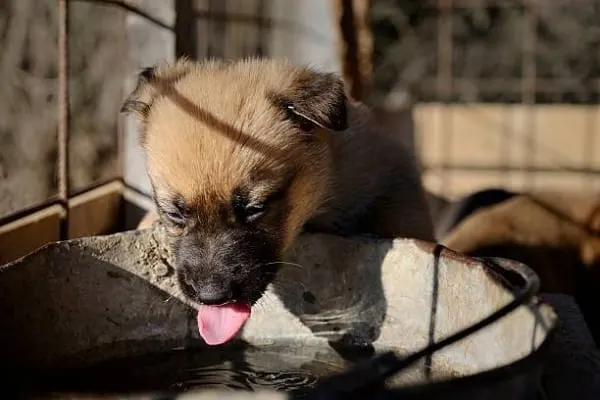
What Should I Keep in Mind About Providing my German Shepherd with Water?
One of the most important things you’ll need to remember about keeping your German Shepherd puppy watered is the amount of water required might vary depending on the time of year or other circumstances.
For example, your puppy will require more water while exercising, and also when the weather is hot. Always keep an eye out for any water consumption that appears to be abnormally high.
You want to make sure you catch any problem early.
A well-hydrated German Shepherd puppy is a healthy puppy. Knowing how to observe the puppy’s water intake is a perfect way to find the balance that your dog needs.














